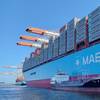ICS to Plead Shipowners' Eco-Concerns to IMO Member States
In advance of a critical intergovernmental meeting next month at the UN International Maritime Organization (IMO), the International Chamber of Shipping (ICS) has called on IMO Member States to give careful consideration to shipowners’ concerns about the implementation of an avalanche of new environmental regulations, which are about to impact on ship operations at more or less the same time.
ICS Chairman, Masamichi Morooka, explained: “The shipping industry is not in any way questioning the need for these important new IMO rules and is fully committed to implementation. But governments need to address some very important issues if they wish to avoid confusion and market distortion.”
In advance of next month’s IMO Marine Environment Protection Committee (MEPC), the ICS Board of Directors, which met in London this week, reviewed the solutions that ICS is proposing to governments with respect to the serious implementation concerns associated with entry into force of the IMO Ballast Water Management Convention, and new MARPOL regulations to reduce sulphur emissions. The ICS Board also reviewed the continuing debate at IMO about additional measures to reduce ships’ CO2 emissions.
Making the Ballast Convention Work
“ICS fully supports the objectives of the Ballast Convention and recognises that its eventual entry into force is inevitable” said Mr Morooka. “But unless some serious problems are resolved at the MEPC next month there is a real risk that the regime will not be fit for purpose. The industry does not wish to spend billions of dollars on new treatment equipment only to be told it doesn’t work.”
ICS says that the IMO ballast regime, expected to come into force during 2016, contains a number of deep flaws, having been adopted ten years ago when the technology required to comply had not been widely tested or proven commercially.
The problems still to be solved include the lack of robustness of the current type-approval process for the very expensive new treatment systems that will be required, and the need to provide confidence to shipowners who have already installed the new equipment, or who are about to do so, that they will be regarded by the authorities as compliant.
ICS is particularly concerned that port state sanctions could impact unfairly on shipowners who, in good faith, have fitted type-approved equipment in accordance with IMO Guidelines, only to be told subsequently that it falls short of the required standard.
At the MEPC meeting from 13-17 October, in conjunction with other industry associations, ICS will propose a solution in the form of a draft MEPC Resolution, which would signal agreement by governments, before the Convention enters into force, to some relatively simple changes as to how the new regime will be implemented.
Sulphur Rules
The 0.1% sulphur in fuel requirements in Emission Control Areas will come into effect on 1 January 2015 but there is still much uncertainty as to how they will be implemented by governments.
The ICS Board agreed that ICS should continue to encourage the Paris MOU on Port State Control to ensure that there is a harmonised approach to implementation and thus avoid market distortion. In particular, ICS is encouraging the acceptance of bunker delivery notes, rather than fuel sampling, as prime face evidence of compliance, unless there are clear grounds for suspecting otherwise; and a sensible approach towards minor technical violations as opposed to the deliberate use of the wrong grade of fuel.
Mr Morooka remarked: “With respect to the issue of fuel availability and the impact on price, there is perhaps even greater concern about the 0.5% global cap in 2020. The increased demand for diesel grade fuel from shipping may have an impact on land based industry too.”
ICS is disappointed that IMO now looks unlikely to advance the conduct of the IMO fuel availability study from 2018 (as required by MARPOL) when it will be far too late to encourage any action needed from governments to help ensure that refiners produce sufficient quantities of fuel, so that ship operators are able to comply.
CO2 Reduction Discussions
The ICS Board noted the pressure from some governments for the industry to do even more to reduce CO2 emissions, despite the fact that shipping is already by far the most carbon efficient form of transport. ICS reiterated its support for the development by IMO of a global system of mandatory CO2 data collection from ships, provided that the system is simple to administer and is primarily based on fuel consumption.
However, ICS also reiterated that the global shipping industry has not agreed to the development of any kind of mandatory operational efficiency indexing system which might be used to penalise ships that are deemed less efficient.
Mr Morooka commented: “No two voyages are the same due to factors such as weather and ocean conditions and many of our members think there is a danger that the development of such an operational indexing system would lead to serious market distortion.”
ICS is keen to stress that IMO has not yet agreed to such an indexing system either, although ICS fears there is a risk that this might still be developed by stealth, with many of those governments involved in the IMO discussions about data collection proposing metrics that might form the basis of such a system. ICS also notes that some governments have been very explicit about their intention to use operational indexing as a means to apply financial penalties to existing ships (in addition to the extra fuel which they already have to pay for).











